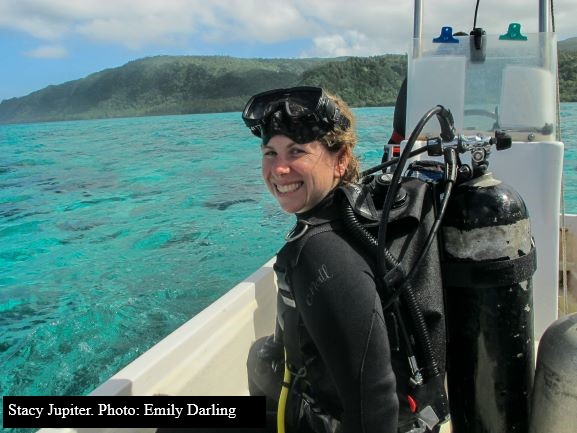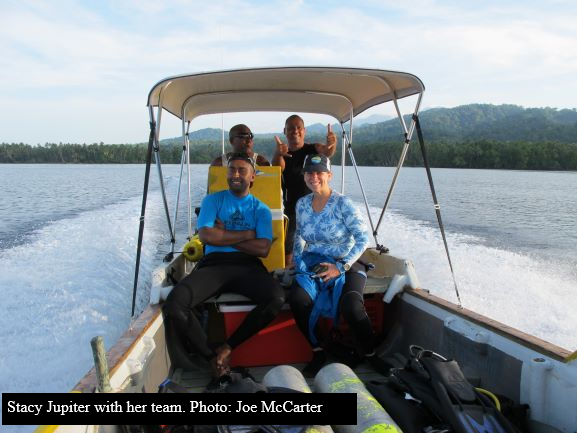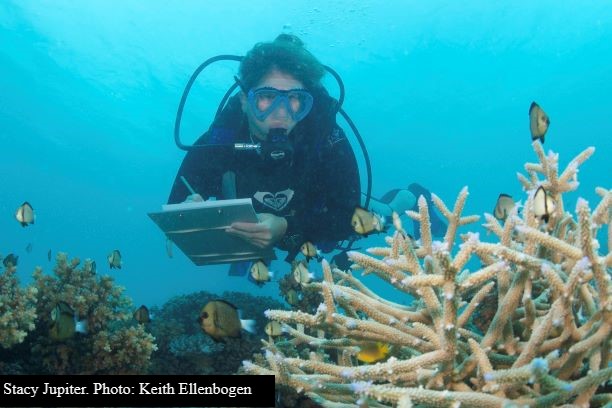The Wildlife Conservation Society’s (WCS) Melanesia Director, Dr. Stacy Jupiter was named a 2019 MacArthur Fellow 2019, a recipient of a Genius Grant, today.

The prestigious award is a recognition of Dr. Jupiter’s work as a marine scientist and conservationist and the innovative ways she has “integrated local cultural practices with field research to develop conservation solutions that protect both the biodiversity of coastal ecosystems and the well-being of communities that dependent on them.”
One of her main focal areas of work has been to assess the effectiveness of locally-managed marine areas (LMMAs) to achieve desired outcomes that local people care about, such as food security, livelihoods and enabling cultural practice. With numerous collaborators in Fiji and abroad, Dr. Jupiter identified under which conditions LMMAs with tabu areas (fisheries closures that are periodically harvested) can be the best strategy for simultaneously maximizing the amount of fish in the water, amount of catch, and ease of fish catch over the course of a year, while allowing for customary harvesting practices.

“For many years, we have been arguing that management undertaken by small-scale fishers in the Pacific Islands is more than just a niche practice,” explains Dr. Jupiter. “This work validates that conclusion, and provides legitimacy to a management tool that is incredibly important for local cultural practice in Fiji and across the Pacific.” The findings are likely to have real impacts on how people around the globe implement fisheries management so that they can have their fish in the water and eat them too.
More recently, Dr. Jupiter has been pioneering an innovative research-to-action project with the WCS Fiji country program and collaborators from University of Sydney, Edith Cowan University, Ministry of Health, Fiji National University and a number of other institutions. The Watershed Interventions for Systems Health in Fiji (WISH Fiji) initiative, which is working to simultaneously reduce water-related disease risk and improve ecosystem health through strategic watershed management measures, has been a decade in the making. Through this work, Dr. Jupiter is trying to galvanize local people to be better stewards of their environment by directly connecting their actions to the things people care most about – their health, food and cultural connections to the land and sea.

Part of galvanizing people means using out-of-the-box thinking to inspire people to take action. Dr Jupiter uses captivating approaches such as flash mobs, comic books and puppets to help people understand the impacts of environmental changes and to reconnect them to nature.
The John D. and Catherine T. MacArthur Foundation provides unrestricted fellowships to talented persons who have shown extraordinary innovation and commitment in their field of expertise that has brought about real change on the ground. There are three criteria for selection of Fellows:
(1) Exceptional creativity;
(2) Promise for important future advances based on a track record of significant accomplishments;
(3) Potential for the Fellowship to facilitate subsequent creative work.
Although Dr. Jupiter was born in the USA, she has lived in Fiji for 11 years and is also a naturalized Fiji citizen. She supports conservation efforts in Fiji, Solomon Islands, Vanuatu, and Papua New Guinea. She has worked across a diversity of fields including land-sea planning, ecosystem based management, locally managed marine areas, fisheries and coral reef resilience.
For more information, please check out the following links:
https://www.macfound.org/fellows/1041/
https://newsroom.wcs.org/News-Releases/articleType/ArticleView/articleId/13103/WCS-Congratulates-Stacy-Jupiter-for-Being-Named-a-2019-MacArthur-Fellow-A-Recipient-of-a-Genius-Grant.aspx
https://www.youtube.com/watch?v=eOQqUDK_Rmw&feature=youtu.be&fbclid=IwAR0J19B4ip_JgDGKCupZYsf1f8-C8lwHY1styjlPnHUsrn2_Av-ssnvAK0Y